The U.N. Office on Drugs and Crime was scrambling today to contain the fallout from a leak that made it clear the office doesn’t universally back one of its core policy stances: that drug use should be illegal. That would have been tough enough if the leak hadn’t gotten an unexpected assist from the publicity-hungry Virgin CEO Richard Branson.
Today, the BBC published a leaked UNODC briefing paper, which “clarifies the position of UNODC” and states that “decriminalising drug use and possession for personal consumption is consistent with international drug control conventions and may be required to meet obligations under international human rights law.” The document convincingly argues that treating the personal consumption of drugs as a criminal offense obstructs access to lifesaving health services, fuels discrimination and violence against drug users, and contributes to mass incarceration, particularly effected the poor and ethnic minorities.
In an expert bit of trolling, Sir Richard, a member of the Global Commission on Drug Policy, who had apparently seen the document before it was released, published a blog post on the Virgin website applauding the UNODC for the policy shift, calling it a “refreshing shift that could go a long way to finally end the needless criminalisation of millions of drug users around the world.” The post appeared under the headline, “Finally—a change in course on drug policy.” It seems likely that Branson knew the organization would backpeddle and broke the embargo on the paper to cheekily “congratulate” them before they had a chance to distance themselves from the paper’s arguments.
The UNODC quickly clarified that the whole thing was an “unfortunate misunderstanding” and that the paper was “neither a final nor formal document.” The document was drawn up by Monica Beg, head of the UNODCs HIV/AIDS section, for a harm reduction conference in Kuala Lumpur. The BBC reports that it has now been formally withdrawn after pressure from “at least one country,” though I’m guessing that quite a few of them would object to its conclusions. (The UNODC denies that there had been pressure to withdraw the document.)
With more governments flouting the U.N.’s official policy by decriminalizing possession of drugs, and several—including Uruguay, Jamaica, and two U.S. states—legalizing marijuana altogether, there’s been increasing pressure on the UNODC to clarify its stance on the issue. Another U.N. agency, the World Health Organization, called for decriminalization last year as has the Global Commission, which in addition to Branson, includes several former presidents and former U.S. secretary of state, George Shultz.
So far, the response from the UNODC has been muddled. The organization did praise Portugal’s fairly radical decriminalization moves in a 2009 report but has stopped short of encouraging other countries to copy them. UNDOC director Yury Fedotov has said that it’s up to member states to decide “what needs to be done” to prevent drug use, but that “legalization is not a solution.” Today’s leak gives the impression that not everyone within the top international drug policy organization is on the same page.
